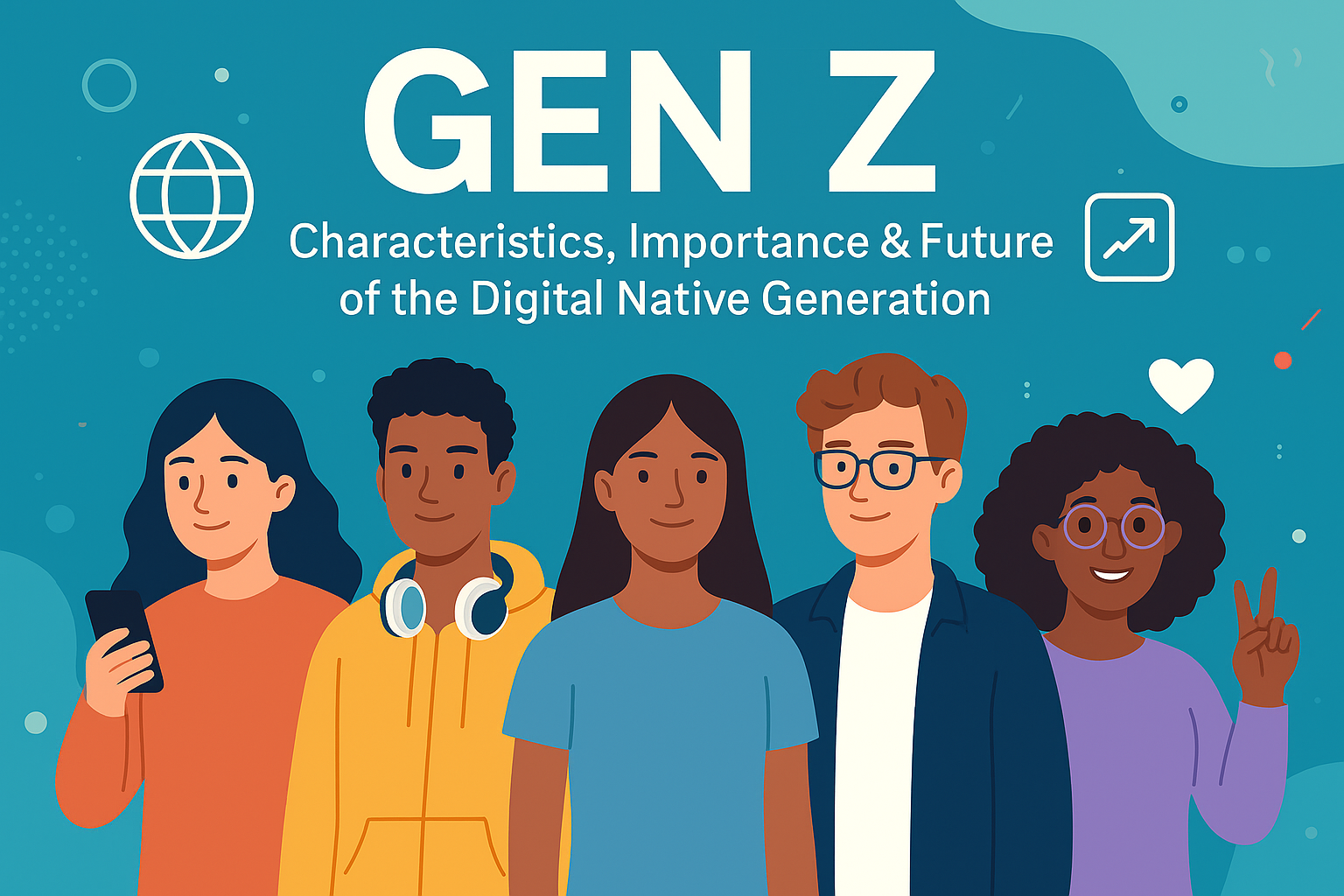Introduction
Thank you for reading this post, don’t forget to subscribe!Every generation leaves a unique imprint on history, culture, and society. After the Millennials, a new cohort has been steadily redefining values, trends, and the global workforce—Generation Z (Gen Z). Born into a digitally connected world, Gen Z is not only reshaping consumer markets but also influencing politics, workplaces, and cultural narratives. But who exactly are they, what makes them different, and why do they matter so much today?
Origin of the Term “Gen Z”
The term Generation Z emerged in the late 1990s and early 2000s, following the naming trend that started with Generation X (born 1965–1980) and Millennials or Gen Y (born 1981–1996). Gen Z typically refers to those born between 1997 and 2012, although the exact years may vary slightly among researchers. They are the first generation to grow up entirely in the digital era, surrounded by smartphones, social media, and instant access to information.
The “Z” does not have a deep symbolic meaning; it was simply a continuation from Generation X and Y. But over time, Gen Z has come to represent zeal, zest, and zero boundaries in terms of global connectivity and opportunities.
Key Characteristics of Gen Z
1. Digital Natives
Unlike Millennials who witnessed the rise of the internet, Gen Z was born into a hyper-connected digital environment. They are fluent in technology, adapt quickly to new platforms, and rely heavily on social media for communication, entertainment, and even education.
2. Diversity and Inclusion
Gen Z is the most diverse and multicultural generation in history. They value inclusivity, social justice, and equality, often challenging traditional norms and supporting progressive causes.
3. Entrepreneurial Mindset
This generation is driven by independence and creativity. Many Gen Zers explore side hustles, content creation, freelancing, or entrepreneurship at an early age, enabled by digital tools and platforms.
4. Pragmatic and Financially Minded
Unlike Millennials, often criticized for idealism, Gen Z is more practical about money and career choices. Having grown up during the Great Recession and global uncertainties, they prioritize stability, savings, and meaningful work.
5. Mental Health Awareness
Gen Z is also known for being open about mental health struggles. They actively seek balance, self-care, and well-being, and they are not afraid to challenge stigmas around therapy or burnout.
6. Global Citizens
Through digital exposure, Gen Z views themselves as part of a borderless community. They are more connected to international issues such as climate change, social justice, and humanitarian causes than previous generations.
Importance of Gen Z
1. Shaping the Workforce
By 2030, Gen Z will make up nearly one-third of the global workforce. Their preference for flexible work arrangements, meaningful careers, and digital solutions is already reshaping corporate policies.
2. Driving Consumer Trends
Gen Z influences markets like no generation before. They prefer sustainable brands, authenticity, and personalized experiences over traditional advertising. Platforms like TikTok, YouTube, and Instagram are their go-to sources for product discovery.
3. Social and Political Impact
Gen Z has been at the forefront of climate activism, racial justice movements, and digital advocacy. They are vocal, mobilized, and unafraid to demand accountability from governments and corporations.
4. Cultural Redefinition
From fashion and music to memes and digital culture, Gen Z is constantly shaping new global trends. Their creativity thrives on platforms like TikTok and Instagram Reels, giving rise to micro-trends that spread worldwide in days.
Dimensions Associated with Gen Z
- Technology and AI Integration
- Gen Z embraces AI tools, automation, and virtual reality. They see these not as threats but as extensions of creativity and productivity.
- Education Preferences
- They prefer skill-based learning and flexible online education over rigid traditional methods. Platforms like Coursera, Udemy, and YouTube tutorials play as much of a role as universities.
- Environment and Sustainability
- Climate change is one of their biggest concerns. They support eco-friendly products and companies committed to green initiatives.
- Identity and Expression
- Gender fluidity, body positivity, and self-expression are central values. They challenge stereotypes and promote individual authenticity.
- Economic Power
- By 2035, Gen Z is expected to hold a significant share of global consumer spending power, shaping industries ranging from fashion and tech to travel and healthcare.
Challenges of Gen Z
- Information Overload: Growing up in an age of constant information can lead to stress and misinformation.
- Mental Health Struggles: High exposure to online comparison culture can lead to anxiety and depression.
- Job Market Pressures: Balancing expectations of meaningful work with financial stability remains a challenge.
- Privacy Concerns: With their lives so deeply online, protecting digital privacy is a major issue.
The Future of Gen Z
Gen Z is not just a “generation in transition”—they are the driving force of the future. Their ability to balance technology with human values, innovation with responsibility, and individuality with inclusivity makes them uniquely positioned to shape a better, more equitable world. Businesses, policymakers, and educators who understand Gen Z’s values and aspirations will thrive in the years to come.
Conclusion
Generation Z is more than a demographic label—it’s a cultural and economic powerhouse. Defined by digital fluency, diversity, and a strong sense of responsibility, they are influencing every sphere of life from workplaces to markets, politics to culture. Understanding Gen Z is no longer optional; it’s essential for anyone looking to stay relevant in today’s rapidly evolving world.

Leave a Reply